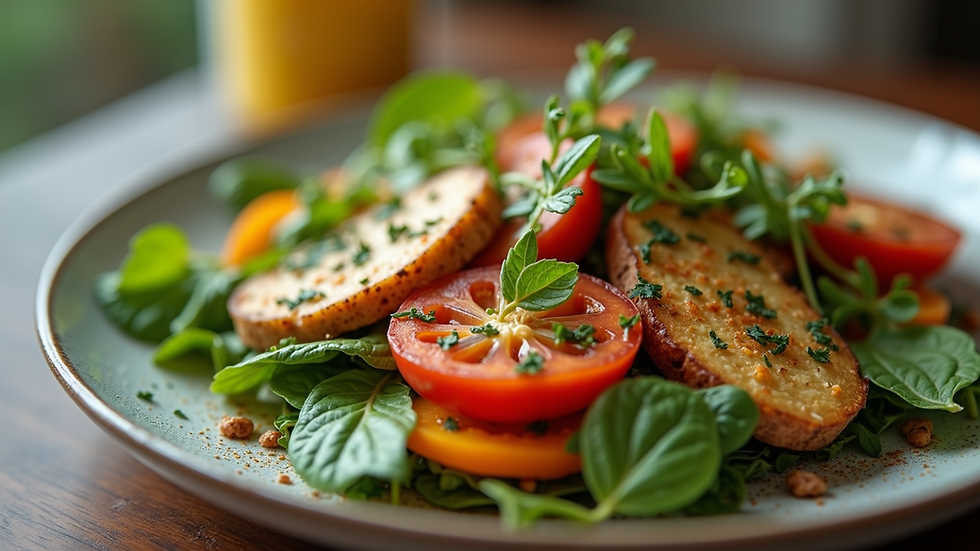The Hidden Connection Between Gut Health and Skin Wellness
- Evo Now Health

- Aug 13, 2025
- 4 min read
The link between gut health and skin wellness is gaining traction, capturing attention in the wellness community. Many might initially see gut and skin health as separate issues; however, research reveals their strong connection. Understanding this relationship can provide new opportunities for achieving healthier skin through thoughtful dietary and lifestyle adjustments.
What is Gut Health?
Gut health refers to the balance and proper functioning of the gastrointestinal system. This includes the diversity and composition of gut microbiota—the trillions of microbes living in our intestines. These microbes play crucial roles in digesting food, producing essential vitamins, and regulating our immune system. For instance, a balanced gut microbiome can influence the digestive system effectively, while an imbalance may lead to digestive issues, inflammation, and broader health concerns.
Interestingly, gut microbiota don't only assist with digestion; they also affect various bodily functions, including hormonal balance and immune responses. For example, studies show that a disrupted gut microbiome may lead to mood disorders like anxiety and depression, indirectly influencing skin health and conditions like acne or eczema.
The Skin-Gut Connection
Our skin serves as a protective barrier and mirrors our internal health. When the gut is not functioning well, harmful substances can enter the bloodstream, causing inflammation and skin issues such as acne, eczema, and psoriasis.
Hormonal imbalances, linked to gut dysbiosis, can disrupt oil production in the skin, increasing the likelihood of breakouts. For example, one study found that individuals with severe acne had higher levels of certain gut bacteria, indicating a potential link. Additionally, nutrients crucial for skin health, such as vitamins A, E, and essential fatty acids, may not be well absorbed when gut health is poor.

How Diet Influences Gut Health
Diet greatly affects the gut microbiome. Foods loaded with fiber—like fruits and vegetables—encourage the growth of beneficial bacteria. Probiotic-rich foods, such as yogurt, kefir, and fermented items like kimchi, help maintain a healthy gut lining and balance.
In contrast, diets high in processed sugars and unhealthy fats can harm gut health, leading to microbial imbalances and inflammation. Research indicates that a high-sugar diet can increase harmful bacteria, contributing to a host of health problems.
Including anti-inflammatory foods, such as fatty fish rich in Omega-3s such as salmon, can benefit both gut and skin health. Moreover, hydration is vital; drinking enough water keeps your gut working smoothly and your skin well-hydrated.
The Role of Stress
Stress significantly affects gut health. The gut-brain axis refers to the relationship between our central nervous system and our digestive system. When stressed, increased cortisol levels may lead to dysbiosis, resulting in various skin issues. Studies show that over 80% of individuals experiencing skin irritations also reported high stress levels.
To combat stress, techniques like mindfulness, yoga, and meditation can be beneficial. These practices not only help reduce stress but may simultaneously improve gut and skin health. As a result, individuals may find themselves experiencing fewer breakouts and enhanced skin texture.
Probiotics: A Potential Solution
Probiotics are live bacteria that can restore gut balance. Consuming probiotics may lead to improvements, not just in digestion, but in various skin conditions. Research suggests that specific strains can boost skin hydration, reduce transepidermal water loss, and lessen the severity of acne.
Before starting any new supplement routine, it is crucial to speak with a healthcare professional who can help tailor the best approach to meet individual needs.

The Importance of Antioxidants
Antioxidants play a vital role in fighting oxidative stress, which can speed up skin aging and lead to various skin issues. Consuming a diet rich in antioxidants can support both gut and skin wellness. Foods such as berries, dark chocolate, and green leafy vegetables are loaded with these beneficial compounds.
For instance, a study found that regular intake of vitamin C can lead to improved skin elasticity and hydration. Ensuring adequate vitamin intake is essential for maintaining a youthful, vibrant complexion.
Lifestyle Factors Impacting Gut and Skin Health
Beyond diet, several lifestyle choices can shape gut and skin health. Quality sleep is essential; research shows that sleep deprivation can make inflammatory skin conditions worse. Regular physical activity not only aids digestion but also enhances circulation, allowing more nutrients to reach the skin.
Finally, it's wise to limit the intake of artificial additives and processed foods, which can disrupt the balance of the gut microbiome and contribute to skin inflammation. Simple changes, such as using whole foods and cooking from scratch, can make a significant difference.
Final Thoughts
The connection between gut health and skin wellness emphasizes the need for a balanced lifestyle. Prioritizing a nutritious diet, managing stress effectively, and adopting healthy habits can improve not only gut health but skin health as well.
The journey to healthier skin often begins in the digestive system. Making mindful choices can lead to a glowing complexion. By embracing this holistic approach, individuals can discover more effective strategies for achieving their desired skin while nurturing their overall health.





Comments